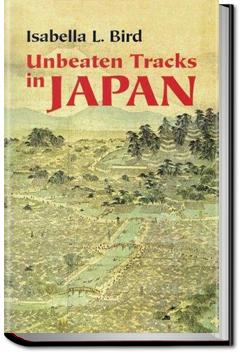UNLIMITED Audiobooks and eBooks
Over 40,000 books & works on all major devices
Get ALL YOU CAN for FREE for 30 days!
Unbeaten Tracks in Japan
Isabella L. Bird
Book Overview:
Unbeaten Tracks in Japan is compiled of the letters she sent to her sister during her 7 months sojourn in Japan in 1878. Her travels there took her from Edo (now called Tokyo) through the interior - where she was often the first foreigner the locals had met - to Niigata, and from there to Aomori. There she crossed over to Yezo (Hokkaido), and her account on the life of the Ainu, an indigenous people of Japan, provides an interesting glimpse of days long past.
Unbeaten Tracks in Japan is compiled of the letters she sent to her sister during her 7 months sojourn in Japan in 1878. Her travels there took her from Edo (now called Tokyo) through the interior - where she was often the first foreigner the locals had met - to Niigata, and from there to Aomori. There she crossed over to Yezo (Hokkaido), and her account on the life of the Ainu, an indigenous people of Japan, provides an interesting glimpse of days long past.
How does All You Can Books work?
All You Can Books gives you UNLIMITED access to over 40,000 Audiobooks, eBooks, and Foreign Language courses. Download as many audiobooks, ebooks, language audio courses, and language e-workbooks as you want during the FREE trial and it's all yours to keep even if you cancel during the FREE trial. The service works on any major device including computers, smartphones, music players, e-readers, and tablets. You can try the service for FREE for 30 days then it's just $19.99 per month after that. So for the price everyone else charges for just 1 book, we offer you UNLIMITED audio books, e-books and language courses to download and enjoy as you please. No restrictions.
Two roads lead to Nikko. I avoided the one usually taken by Utsunomiya, and by doing so lost the most magnificent of the two avenues, which extends for nearly fifty miles along the great highway called the Oshiu-kaido. Along the Reiheishi-kaido, the road by which I came, it extends for thirty miles, and the two, broken frequently by villages, converge upon the village of Imaichi, eight miles from Nikko, where they unite, and only terminate at the entrance of the town. They are said to have been planted as an offering to the buried Shoguns by a man who was too poor to place a bronze lantern at their shrines. A grander monument could not have been devised, and they are probably the grandest things of their kind in the worl. . . Read More
Try now for FREE!

"Love your service - thanks so much for what you do!"
- Customer Cathryn Mazer
"I did not realize that you would have so many audio books I would enjoy"
- Customer Sharon Morrison
"For all my fellow Audio Book & E-Book regulars:
This is about as close to nirvana as I have found!"
- Twitter post from @bobbyekat



Community Reviews
The back cover blurb rightly lauds Bird as a feminist pioneer and astute observer of rural Japanese life in the late 19th century; however, the blurb doesn't mention Bird's embarrasing attitude towards the majority of those people (with the exception of the Ainu). She describes people in dehumanisin
Relato de viajes en formato epistolar del Japón mas aislado de finales del s.XIX, es increíble como una mujer británica sola se lanzara a tal aventura por unas tierras absolutamente inexploradas por ningún occidental, aunque en realidad no debería sorprenderme porque hay bastantes mas casos de muje
The author seemed extremely curious, exploring, for example, "savage people" and cremation service. Her descriptions are very detailed, if at places quite repetitive and lack of distillation. The book is a good source of imagery not only of Japan in 1878, but also of how prejudice a British such as
While the content was interesting, I found the narrator so annoying that it really took away from the experience from me. Isabella Bird was one of those "invalids" who enjoy poor health--they can't be expected to lead a normal productive life at home because they are "delicate"--and yet she could tr
I gave this 5 stars not because it's a work of great literary merit but because the tale it tells is truly amazing. Imagine traveling as a foreigner from Yokohama all the way to the far reaches of Hokkaido ... in 1878. And this is not a hardy, experienced and intrepid traveler but a Victorian lady w
Like all of Bird's books, this was a really fantastic glimpse into a country at a certain time from the perspective of a 19th century person, a woman, and a Brit at the height of empire. I very much enjoyed seeing what life was life for average folks across Japan back then, I love her for traveling